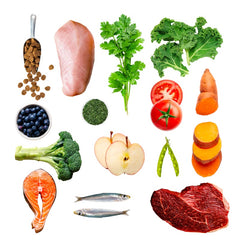The Importance of Keeping Your Dog’s Gut Healthy

A healthy digestive system is essential to your dog's overall health and well-being. Paying close attention to the signs of poor gut health in your pet can help you take measures to protect their long-term physical and mental wellbeing.
Learn more about what causes poor gut health in dogs, some common symptoms, and how to help keep your hound's digestion system healthy. The solutions are in most cases simple!
How to Check for Symptoms of Poor Gut Health in Your Dog
There are several signs that can indicate poor gut health in dogs. Here are some common symptoms to look out for:
-
Diarrhea: A sudden change in the frequency, consistency, or color of your dog's stools can be a sign of digestive issues. One of the most common and easily detected signs of poor gut health in your dog is a change in their bowel movements. If you notice frequent diarrhea or constipation, which may indicate an imbalance in the bacterial flora of your pup's digestive system. It’s important to take note and ensure that they are getting the proper balance of food, vitamins and minerals to support the healthy functioning of their digestive system.
-
Vomiting: Vomiting can be a sign of poor digestive health in dogs. Vomiting can occur due to a variety of reasons, including digestive upset, dietary indiscretion, eating something toxic, or a blockage in the intestines. However, it's important to note that vomiting can also be caused by other health issues, such as infections, metabolic disorders, or neurological problems.
If your dog is vomiting frequently or if the vomiting is accompanied by other symptoms, such as diarrhea, loss of appetite, or abdominal pain, it's best to take them to a veterinarian for a proper evaluation and diagnosis. Your vet may perform a physical examination, blood tests, or other diagnostic tests to determine the underlying cause of the vomiting and recommend the best course of treatment.
-
Loss of appetite: A decrease in the amount of food your dog is consuming could indicate digestive discomfort. There are many reasons why a dog may lose their appetite, including digestive issues, such as stomach pain, nausea, or inflammation of the gastrointestinal tract. Other factors that can cause a loss of appetite include stress, depression, dental problems, infections, and certain medical conditions.
If your dog is not eating or has a reduced appetite, it is important to consult with a veterinarian to determine the underlying cause and to develop a treatment plan. In some cases, dietary changes or the administration of medication may be recommended. If left untreated, a loss of appetite can lead to weight loss and other health problems.
-
Abdominal pain or bloating: This can be indicated by restlessness, panting, or signs of discomfort when your dog is touched in the belly area.
There are many reasons why a dog may experience abdominal discomfort, including digestive issues such as constipation, diarrhea, inflammatory bowel disease, and gastrointestinal tract blockages. In some cases, bloating can also be a symptom of a more serious condition such as gastric torsion, which can be life-threatening.
If your dog is experiencing abdominal pain or bloating, it's important to consult with a veterinarian to determine the underlying cause and to receive appropriate treatment. In addition to medical treatment, you can also help support your dog's gut health by feeding them a balanced diet, providing them with plenty of water, and avoiding any foods or substances that may be harmful to them.
-
Flatulence: Excessive farting can be a sign of digestive upset. Some carbohydrates are not fully broken down in the small intestine and reach
the large intestine where they are fermented by bacteria, leading to the production of gas. Feeding your dog a Grain-Free Dog Food Formula that is free of preservatives and bulking agents can make dramatic improvement to good gut health. Try our range of Grain-Free Dog Food that Delivery Hound offers, and have it delivered free to your door!
-
Weight loss: Unexplained weight loss in a dog can be a sign of digestive issues, especially if accompanied by other symptoms mentioned above. When a dog has poor gut health, they may not be able to absorb and digest food properly, leading to weight loss. It's important to consult with a veterinarian if your dog is experiencing unexpected weight loss, as this can be a sign of a more serious underlying health condition.
-
Dehydration: A decrease in water intake or an inability to retain fluids can be a sign of digestive problems. When a dog has poor gut health, they may not be able to absorb fluids properly, leading to dehydration. This can occur as a result of diarrhea, vomiting, or other digestive issues that result in fluid loss. It's important to consult with a veterinarian if your dog is experiencing dehydration.
How do I improve my dog's digestive health?
If you suspect your dog is experiencing digestive issues, or they are presenting any of the symptoms of poor gut health, we recommend the following to send them back to good health:
-
Feed a balanced diet: Feed your dog a balanced diet that includes high-
quality protein, quality carbohydrates, and healthy fats. Avoid feeding them table scraps or foods that are high in fat, as this can upset their digestive system. The formula's available in the Man's Best Grain-Free range of dog food are a well balanced, all natural, vet approved diet. All formula's have a money back guarantee, try them today!
-
Provide plenty of water: Ensure that your dog has access to fresh, clean water at all times. Encourage them to drink water by making it readily available and by providing them with a water bowl that is easy to access.
-
Incorporate fiber into your dog's diet: Fiber can help regulate digestion and prevent constipation. Good sources of fiber for dogs include pumpkin, sweet potatoes, and green beans.
-
Consider probiotics: Probiotics are beneficial bacteria that can help support a healthy gut. You can find probiotics in supplement form or in certain types of dog food.
-
Avoid sudden dietary changes: Sudden changes to your dog's diet can cause digestive upset. If you need to change your dog's diet, do so gradually over a period of several days to give their digestive system time to adjust. More information on transitioning to a new dog food is available on our blog here!
-
Exercise regularly: Regular exercise can help regulate digestion and prevent constipation.
If your dog is experiencing digestive issues, it's important to consult with a veterinarian to determine the underlying cause and receive appropriate treatment.
©deliveryhound.com.au 2023








